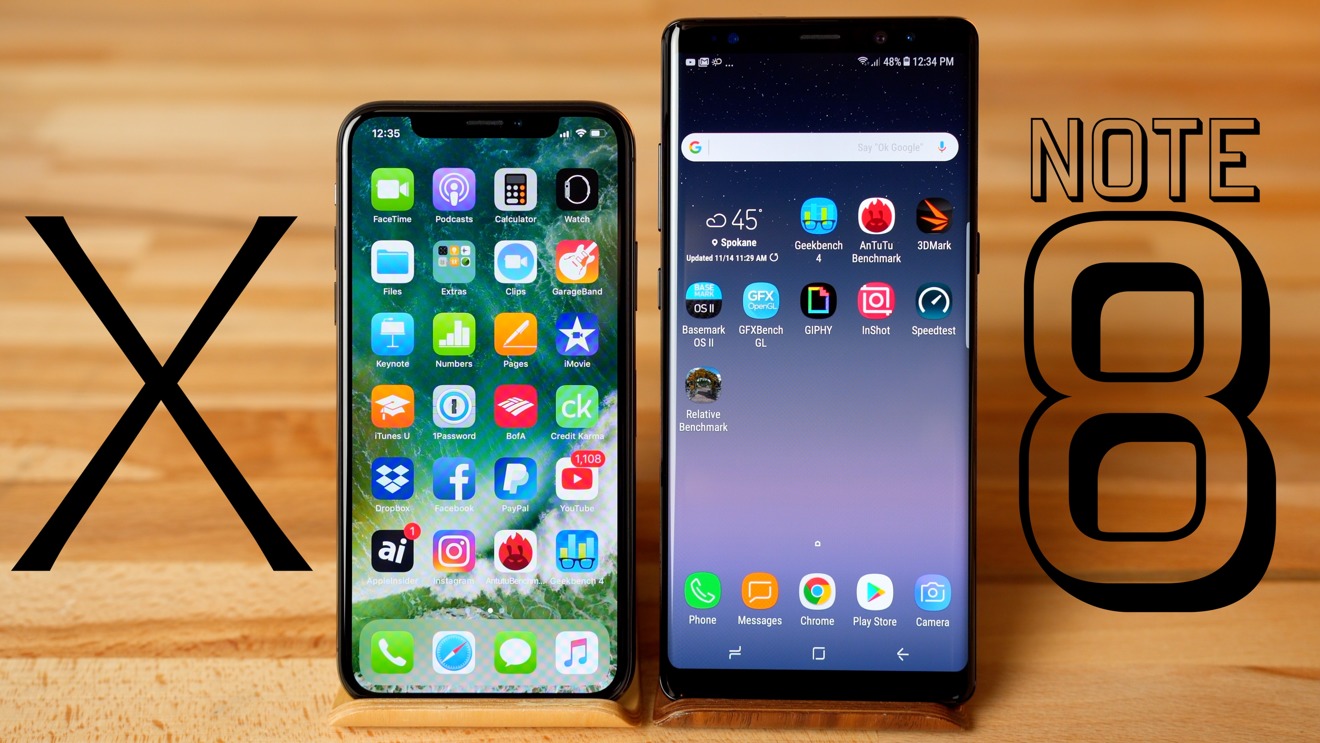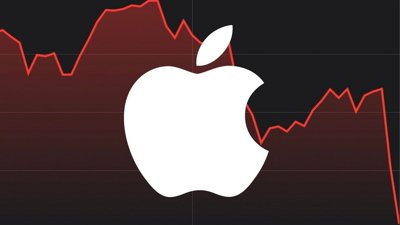The consumer wars between Apple and Samsung will go on as long as both companies are around, as will the debates around which flagship device is more powerful. AppleInsider gets both the iPhone X and the Galaxy Note 8 on our test bench, and put them both through their paces.
The truth is, both devices are more than powerful enough for our daily needs, but since we got our hands on both of them, AppleInsider decided to run some benchmarks to compare the two devices.
As far as the hardware goes, the iPhone X's A11 Bionic processor has six cores total, with two high performance cores, and four efficiency cores. It also has a three-core graphics chip and 3GB of RAM.
The Note 8 has an eight-core processor, with four high performance cores and four more efficient cores. It also has 6GB of RAM — twice as much as the X. It's worth noting that the Note 8 is pushing more pixels, which takes more power to render.
More cores doesn't always mean more performance. There are a limited amount of apps that can actually put up to six and eight cores to use. A lot of apps actually use one or two cores, with apps only slowly transitioning into using more, efficiently.
Starting with the Antutu benchmark, The iPhone X comes in at around 31 percent faster than the Note 8. In Basemark OS 2, the iPhone X is 17 percent faster.
In 3DMark's Sling Shot Extreme benchmark, the scores were very similar, with the Note 8 gaining a small advantage.
Let's move onto a couple browser benchmarks. Keep in mind that it's not purely based on the device, but also on the browser. Chrome is now the default for the Note 8, and of course Safari remains the standard for the iPhone X.
In Antutu's HTML5 test, the iPhone X was 62 percent faster than the Note 8.
The iPhone X completely destroyed the Note 8 in the Jetstream 1.1 javascript benchmark. This may be due to optimization issues with Chrome, so don't give the iPhone X by itself too much credit.
Now let's finally get to the popular Geekbench 4 benchmark. For the single core test, the iPhone X blew the Note 8 out of the water, with over double the score.
Apple's iPhone line is known for strong single-core performance, and since most applications benefit more from powerful single cores than multiple weaker cores, even dual-core iPhone's were able to keep up in performance when Android devices were already moving up to four and more cores.
Moving on to the multi-core test, the iPhone X is actually 53 percent faster than the Note 8, even though the Note 8 has eight cores, compared to six on the iPhone X.
Finishing off with the GPU benchmark, the iPhone X was 59 percent faster than the Note 8, but that's using Metal on the iPhone. Keep in mind that even though the GPU shows that much of a performance boost, the more realistic Slingshot Extreme benchmark scores were similar.
Either way, both devices are extremely powerful, but these tests show that Apple comes out the clear winner.
 AppleInsider Staff
AppleInsider Staff



-xl-m.jpg)



-m.jpg)






 Malcolm Owen
Malcolm Owen
 Marko Zivkovic
Marko Zivkovic

 Chip Loder
Chip Loder
 Christine McKee
Christine McKee
 William Gallagher
William Gallagher
 Amber Neely
Amber Neely


-m.jpg)






45 Comments
It's an absolute embarrassment that Samsung with more cores does much worse than an iPhone with what is technically a "slower" chip. Shameful. It's a testament to Samsung's marketing brainwashing department to make people (you listening Fandroids) believe that Samsung has the lead in innovation.
Benchmarks are their own measurement, and not always highly applicable to real-world use. For example: a benchmark must simulate a multi-core app in order to test multi-core performance, but the actual user may not yet be using any apps that really take advantage. That said, benchmarks are useful for overall trends, and the overall trend here is that the iPhone X kicks Samsung ass, nearly any way you slice it. It does not surprise me that the “more realistic” (read: game-oriented) Slingshot test showed the GPUs more evenly matched: Samsung was well aware that it had to push a higher number of pixels around than Apple was likely to need to. So I think it’s broadly fair to say the GPUs are roughly equal between the two, minus Apple’s use of Metal (which nearly all developers are going to take advantage of, giving Apple a significant win now and going forward). It also seems clear that the figures give Apple a huge win in every area of “typical” use (which for 90 percent of users 90 percent of the time is more dependent on the speed of their connection more than anything). I think if someone developed a test suite that simply emulated the performance of FaceBook, YouTube, the default browser on each system, and some of the most popular games for each platform, you’d get close to a “real world” number than everyday people (more so than “power users”) could relate to.
And iPhone X said to Samsung Note, "Who's your daddy? I am!" Benchmarks really don't matter. As long as the fAndroids believe the Note is faster than iPhone X, then everyone is happy, right? More is always better, right? The fAndroids are already anticipating the Snapdragon 845 to blow the A11 away. Happiness comes to those who wait.
I'm curious to see what the long term performance is. In other words, does it heavily throttle after a couple of minutes of use? Would the scores of the benchmarks see drastic changes on the 2nd or 3rd run? It's hard to say as some of the benchmarks, such as Geekbench, will give a pause to prevent thermal throttling. Are the numbers the Galaxy and iPhone outputting even sustainable beyond a couple minutes of real world use?
I think you're forgetting about Vulkan which launched a year or two back on Android. Most major engines already support it (Unreal, Unity, CryEngine, Source 2, etc.).
Since when did having more cores make something "technically" faster? Your logic doesn't make any sense.